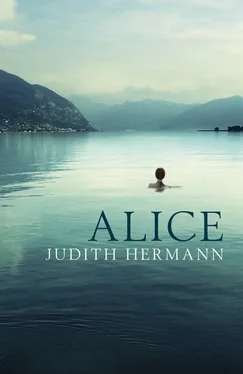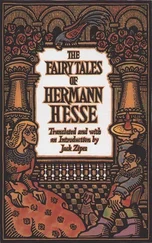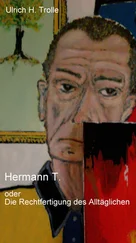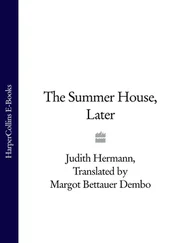Judith Hermann - Alice
Здесь есть возможность читать онлайн «Judith Hermann - Alice» весь текст электронной книги совершенно бесплатно (целиком полную версию без сокращений). В некоторых случаях можно слушать аудио, скачать через торрент в формате fb2 и присутствует краткое содержание. Год выпуска: 2011, Издательство: Clerkenwell, Жанр: Современная проза, на английском языке. Описание произведения, (предисловие) а так же отзывы посетителей доступны на портале библиотеки ЛибКат.
- Название:Alice
- Автор:
- Издательство:Clerkenwell
- Жанр:
- Год:2011
- ISBN:нет данных
- Рейтинг книги:3 / 5. Голосов: 1
-
Избранное:Добавить в избранное
- Отзывы:
-
Ваша оценка:
- 60
- 1
- 2
- 3
- 4
- 5
Alice: краткое содержание, описание и аннотация
Предлагаем к чтению аннотацию, описание, краткое содержание или предисловие (зависит от того, что написал сам автор книги «Alice»). Если вы не нашли необходимую информацию о книге — напишите в комментариях, мы постараемся отыскать её.
Alice — читать онлайн бесплатно полную книгу (весь текст) целиком
Ниже представлен текст книги, разбитый по страницам. Система сохранения места последней прочитанной страницы, позволяет с удобством читать онлайн бесплатно книгу «Alice», без необходимости каждый раз заново искать на чём Вы остановились. Поставьте закладку, и сможете в любой момент перейти на страницу, на которой закончили чтение.
Интервал:
Закладка:
Men with gold teeth were playing cards, under sun-bleached umbrellas in front of the kiosk where Raymond as a child had bought ice cream in a soft waffle, chocolate-coated vanilla wrapped in silvery foil. Tattoos, anchors on chains and hearts pierced by daggers, faded blue: For ever and ever. Naked people were sunning themselves on the lawn. Lying around singly under the white sky like people who’d been shot dead. Nothing was moving, except a threatening cloud of mosquitoes above a puddle at the end of the path, and the red and white barrier tape rattling between the trees in an imperceptible breeze.
Alice pushed her bike home through the afternoon streets. Some days she would push it all the way; she had the feeling that she was in danger and had to watch out and take care of herself, too tired from the heat and too deeply preoccupied to ride a bike — she thought, if I ride I’ll have an accident, fly over the handlebars, and be run over, break my neck, break all my bones.
Take care of yourself.
You too.
And so she didn’t ride. Bought strawberries at the corner from a stand shaped like a giant fruit. It had a green plastic stem on the roof, and in the shade inside were mountains of glowing strawberries in cardboard boxes stacked into pyramids. No, not a whole kilogram, thanks. Only half a kilo strawberries for Alice alone. She carried the berries home in a transparent bag. Locked the bike to the rack in front of the house. Since Raymond’s death she no longer kept it in the courtyard. It was too much trouble, and she’d done it only for his sake; he thought the bicycle was safer in the courtyard.
The hallway was stifling. The apartment, quiet. Alice washed the strawberries long and thoroughly, letting the cold water run over her wrists, her rapid pulse. She cut the berries in half, then into quarters, sugared them, added a shot of vinegar, and put the bowl into the refrigerator. The blue flowers on the windowsill extended their austere, sturdy little petals — thirteen on each stem — towards the sun, impassive but purposeful.
Alice changed the beds. One sheet, two pillowcases, two blankets. She put on a fresh duvet cover. Crisp and cool the first night. She didn’t dream that her teeth were falling out. Or that new ones would grow in their place.
She went to visit Margaret. Driving her car out of the city to the house-with-garden where Margaret now lived. A house in the suburbs, decentralised in many respects. They sat next to each other on the porch made of tropical wood and gazed at Margaret’s flowers, the luxurious splendour of her flower beds: snapdragons, hydrangeas, and columbine, Japanese lilies.
Acqua Alba. The sky was blue, the planes were flying elsewhere. In the distance, the summer sounds of lawnmowers, water sprinklers, the clatter of hedge shears. A cat came noiselessly onto the porch, sneezed dryly, settled down in front of them, straightening her front legs, and turning sideways, showing them her cat profile.
Cats do that, Margaret said. With two people they always position themselves so as to form an equilateral triangle. They always do that.
Alice looked at the cat, its reddish brown fur; the white spot at the end of the tail twitched slightly. Malte, Frederick, Pumi. It was reassuring to put everything she had together in her mind, put it together and see what the result would be.
And how to go on from there? Even with all the exhaustion — it was after all still early. The first days and weeks and months without Raymond — the days would never again be this clear and luminous; maybe she would have to learn how to find pleasure in it; any other way was impossible.
Richard said I would need three years, Margaret said. Just like that, he said it, imagine that. You’ll need three years, then things will be easier for you.
And is it true? Alice asked.
No idea, Margaret said. A year has passed now, only one year, I’m far from understanding how he meant it. Three years. Would you like to take a few flowers home with you?
Yes, I’d love to, Alice said.
The lawn had been mown. Alice stood in the grass, barefoot. Margaret walked along the flower beds with a pair of scissors. Dahlias, sunflowers, and one thistle stem. The lawnmowers were silent now, wasps hummed around their nest in a pine tree. Cold orange juice. A wind sprang up, the porch door slammed shut, flat clouds in the sky.
Later on Alice went inside. Walking on the light-coloured tiles. Past the bookshelf on which stood a black and white photo of Richard. Taken in front of the bookshelf on Rheinsberger Strasse.
After that she gave away her car. It was quite clear that she had to give it away. It was too expensive, she couldn’t afford it now that she was by herself; she used it far too rarely. Without Raymond, in fact, she didn’t drive anywhere, and she didn’t have to pick him up any more or take him somewhere; she’d stay put now. For that the bicycle and tram were adequate. She placed an ad in a car magazine, filling out the form in capital letters. Year: ’87. Colour: red. Small dent on offside bumper. Windscreen slightly scratched. She worded it as best she could, and at the end thought up a price, not knowing whether it was appropriate or not. It seemed fair to her. Any price. What should it cost? It didn’t matter.
The telephone began to ring in the middle of the night, at four a.m. Alice was lying on her back in bed, listening to the voices on the telephone answering machine, their graphic statements, foreign accents, thrice-repeated phone numbers, feverish promises. Requests to call back. Somewhere in the city all these people were wide awake. Busy. They had plans and were carrying out intentions. They had goals. She couldn’t get herself to pull the plug out of the wall. Towards morning the phone stopped ringing. Quiet. Alice fell asleep. The first ball bounced against the fence of the basketball court. In the courtyard the wind rustled heavily in the trees.
At noon she walked to the car, carrying a blue bin bag and wearing sunglasses. Tropical temperatures. People were sitting in a row in front of the cafés in the semi-shade of the awnings; butter melting on their plates. Market stalls stood huddled at the edge of the park; the sun beat down on the cobblestone pavement. Cherry time. The last of the strawberries. Someone full of confidence had planted beans in the dust-dry soil surrounding the locust trees. Her car was parked at the planetarium. Alice unlocked the car door. Half-kneeling on the passenger seat, she opened the glove compartment and pulled out everything in it. Everything. Raymond’s matchbooks, a chemist’s calendar, petrol receipts, advertising leaflets. His supermarket discount coupons, other coupons. A creased photo of a chair standing next to a birch tree in front of a collapsed factory building. Ruins. Some sort of object on the ground next to the chair; Alice squinted, staring at the photo, but couldn’t make out anything. She wouldn’t be able to make out anything tomorrow either, or the day after tomorrow, not ever. Into the blue bag went the photo. Everything else too. And then among all the scraps of paper, suddenly — it could happen that quickly — she saw the plastic card, a green laminated card. Not the one from the gypsy back then, ages ago, but another one; still, they were probably all the same anyhow. I am interested in your car. Now or later. Anytime. Give me a call. I’ll be right over. Alice crawled out of the car, whipped open the boot lid, stuffed everything that was in the boot into the blue bag. The picnic blanket — a colourful tartan, frayed at the edges, some of last autumn’s leaves still in its folds. Hellsee. Or Lanke. Müritz. Water bottles, into the bag. An umbrella, the Thermos flask actually had something in it, some ancient liquid, probably tea made of leaves that Raymond had held between his fingertips. Holy, holy. Should she drink it? She dropped the flask into the blue bag and could hear the glass inside it breaking, a delicate splintering.
Читать дальшеИнтервал:
Закладка:
Похожие книги на «Alice»
Представляем Вашему вниманию похожие книги на «Alice» списком для выбора. Мы отобрали схожую по названию и смыслу литературу в надежде предоставить читателям больше вариантов отыскать новые, интересные, ещё непрочитанные произведения.
Обсуждение, отзывы о книге «Alice» и просто собственные мнения читателей. Оставьте ваши комментарии, напишите, что Вы думаете о произведении, его смысле или главных героях. Укажите что конкретно понравилось, а что нет, и почему Вы так считаете.












